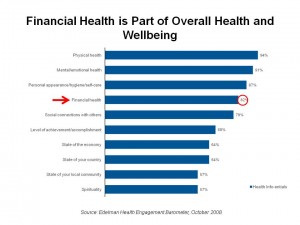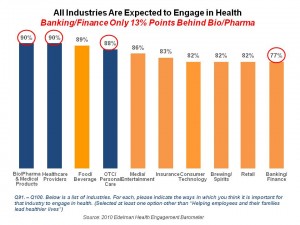Health is not just the purview of health care companies. It’s the job of all industries, according to consumers who live in 11 countries the world over.
The headline finding of the 2010 Edelman Health Engagement Barometer is that Health is the New Green. As green has been a sustainability strategy for business these past several years, Health is following in Green’s footsteps, as Nancy Turett, Global President-Health for Edelman says, “to both propel and protect businesses.”
Look at the chart: while nearly all consumers believe that bio/pharma, health providers, and the over-the-counter (OTC) and personal care industry should engage in health beyond providing employee health benefits, 9 in 10 people think that food/beverage and media/entertainment businesses should engage in health beyond their “immediate family” of workers.
The food industry ranks high between health providers and OTC/personal care. For many of us consumers, food is health — note the current popular influences of Michael Pollan, whose books persuade many to seek a more locavore foodstyle, and Jamie Oliver, the iconoclastic British chef who, having revolutionized Brit-kids’ school lunches, is now in America trying to re-engineer the way Yanks eat and define real food. And any media consumer who consumes prime time broadcast should be familiar with Jamie Lee Curtis’s celebrity endorsement work with Dannon’s Activia brand of probiotic yogurt for gut health.
So food is fairly straightforward when it comes to its health connection. Strikingly, health engagement is also sought by most people from the likes of insurance, technology, brewers, retailers, and even banks and financial services. Note that banking and financial services come just 13 points behind the most traditional health segments — pharma and health providers.
 To that point, I’ll remind Health Populi readers about a fascinating finding from the first, 2008 Health Engagement Barometer: that the most engaged people in health, the so-called Health Info-entials, ranked “financial health” just behind physical health, mental health, and personal appearance in how they self-define personal health and well-being.
To that point, I’ll remind Health Populi readers about a fascinating finding from the first, 2008 Health Engagement Barometer: that the most engaged people in health, the so-called Health Info-entials, ranked “financial health” just behind physical health, mental health, and personal appearance in how they self-define personal health and well-being.
Health for people living in the 11 nations polled by Edelman has morphed from the personal to the global. The health of the public is at least as important as the health of the planet. That connects the strategic dots between Green and Health.
The Health Engagement Barometer surveyed 15,257 adults 18 and older in 11 nations: Brazil, Canada, China, France, Germany, India, Italy, Japan, Mexico, the United Kingdom, and the United States in February and March 2010. The survey was done online.

What do these findings mean for incumbent health care companies — the likes of Big Pharma, biotech, hospital systems, consumer health marketers? There’s good news, bad news; threats and opportunities. On the positive side of the strategy ledger, you’ve been at this health care game for quite some time. You’ve researched, developed, manufactured, marketed, sold, advertised, communicated about health for decades. Some of you have spent hundreds of millions to communicate messages to health consumers.
On the liabilities side, too many of you have lost credibility with your publics: consumers, patients and caregivers; physicians, nurses, and pharmacists alike. Whether through FDA recalls and black box warnings, litigation stories in the press, or direct-to-consumer advertising that just didn’t hit the mark in the eyes of your publics, many of you have lost the trust bond with your end-users, prescribers, and influencers.
This leaves open the door for new players, disruptors, competitors to learn to effectively health-message the very publics who are your core markets. On one hand, you could be afraid — very afraid — that these newcomers from food and retail, technology and financial services will be competing for consumers’ mind- and heart-share. And don’t forget that many of these companies are well-respected with lots of goodwill and trust among their publics. Think of how beloved peoples’ new iPads are becoming to them and you get my drift.
On the other hand, you get health — or you should. After all, you’ve engaged in market research on innumerable health topics and segment your publics every-which-way. So you have the potential to corral those insights for this new, more engaging health consumer.
Health citizens the world over clearly want to engage — with companies who embrace the whole health zeitgeist. Edelman’s survey reveals, though, that there are different types of health engagement people want to see from these various industry sectors. So the opportunity is not only to engage in health — but in health, the right ways as the public views them.
Another opportunity for health care companies and organizations is to re-build the trust that has eroded over the past decade, as demonstrated by the Edelman Trust Barometer as well as similar polls conducted by Harris Interactive and others that measure the public’s collective faith in organizations. How to re-build trust? One way is to partner with other organizations the public already trusts — like consumer technology, which came up #1 in trust across industry sectors in the 2010 Edelman Trust Barometer. So think: can you develop a useful and cool iPhone health app? Can you message via MTV the way the Get Yourself Tested project is doing to prevent STDs? Might you partner with American Express to innovate a wellness program that earns dollars in a money market fund?
Engaging with health for businesses might not just Be the New Green: based on the Health Engagement Barometer data, implementing health strategies might generate some green, too.





 I am so grateful to Tom Lawry for asking me to pen the foreword for his book, Health Care Nation,
I am so grateful to Tom Lawry for asking me to pen the foreword for his book, Health Care Nation,  I love sharing perspectives on what's shaping the future of health care, and appreciate the opportunity to be collaborating once again with Duke Corporate Education and a global client on 6th May. We'll be addressing some key pillars to consider in scenario planning such as growing consumerism in health care, technology (from AI to telehealth), climate change, and trust -- the key enabler for health engagement or dis-engagement and mis-information. I'm grateful to be affiliated with the corporate education provider
I love sharing perspectives on what's shaping the future of health care, and appreciate the opportunity to be collaborating once again with Duke Corporate Education and a global client on 6th May. We'll be addressing some key pillars to consider in scenario planning such as growing consumerism in health care, technology (from AI to telehealth), climate change, and trust -- the key enabler for health engagement or dis-engagement and mis-information. I'm grateful to be affiliated with the corporate education provider  Thank you FeedSpot for
Thank you FeedSpot for